|
In This Issue...
 |
The Truth About Hatching
Programs |
 |
Duck Alien X-Ray |
 |
Our Grand Opening |
 |
Our 1st Great Grandduck! |
 |
Get to Know Your Predators: Domestic Cat |
 |
Recommended
Reading:
Silly Suzy Goose |
 |
Reader Poll #18
|
Our Grand
Opening
Thank you
to everyone who showed up for our Grand Opening! Many of
you brought along needed items and even a readiness to
help clean our barn! Thank you for making the day so
special.
Our 1st Great
GrandDuck!
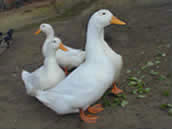
Standish was rescued in fall 2004
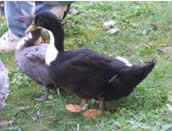
His son Boots hatched in 2005
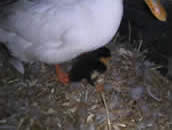
Louie Louie hatched in 2006
***We do not allow eggs
to hatch at Majestic. These ducklings all arrived
post-adoption!
Get to Know
Your Predators: Domestic Cat
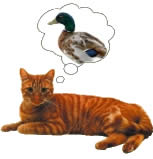
Domestic Cats weigh in anywhere between 5 and 16 pounds,
although some breeds can weigh as much as 25 pounds. The
temperament of a cat will depend on its breed and
socialization. Cats are very high jumpers, excellent
hunters and catch their prey much more frequently than
they miss it.
Cats
and kittens are deadly to a duckling or small duck.
However, a full grown, heavy weight duck will most
likely not be of any interest to your full-grown cat
(unless you happen to have a bit of a monster on your
hands). Kittens can be introduced to a flock of adult
ducks with great success. In this way, a kitten can grow
up and become a pseudo member of the flock, protecting
the premises from rodents, weasels and birds. The
relationship between the guardian cat and the ducks
should be closely monitored and the cat should be
removed if you see any early signs of trouble—trust your
instincts on this one.
Recommended
Reading*

Silly Suzy Goose
By Petr Horacek
|
Ordering
information |
Description:
Silly Suzy Goose is just like all
the other geese. But how she wishes she could hang upside-down like
a bat or stretch up high like a giraffe! And wouldn't it be
wonderful to jump, jump, JUMP like a kangaroo? Suzy Goose wanders
farther and farther from her flock, visiting with animals that are
very different from her. But when Suzy meets up with a cranky lion,
she learns there may just be some advantages to blending in with the
crowd!
*For
our full recommended viewing/reading list, click
here. If you order from
Amazon.com by way of our web site, Majestic receives a
portion of the proceeds!
Reader Poll
#18
Question: What do
you think caused the alien face in the IBRRC mallard duck
x-ray?
Results of Reader Poll #17 Which
types of fresh eggs have you eaten?
|
Duck Eggs |
Yes |
 |
|
Goose Eggs |
Yes |
 |
|
Quail Eggs |
Yes |
 |
|
Ostrich Eggs |
No |
 |
|
Chicken Eggs |
Yes |
Contact Us
Majestic Waterfowl
Sanctuary
17 Barker Road
Lebanon, CT 06249
directorATmajesticwaterfowl.org
Our Newsletter
The Majestic Monthly is published 12 times per year. Back
issues can be obtained online from our
Newsletter Archives.
|
|
The Truth About
Hatching Programs
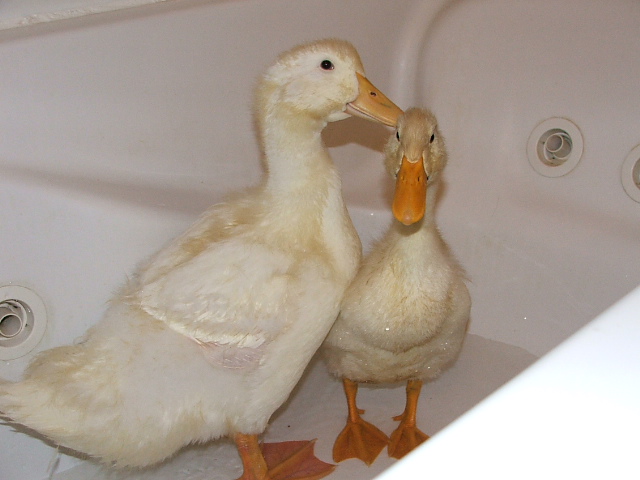 This
is the time of year when many schools are left with the end results
of their hatching programs. As part of their science programs, many
teachers incubate eggs and teach children about the different
development stages of growing ducklings. This
is the time of year when many schools are left with the end results
of their hatching programs. As part of their science programs, many
teachers incubate eggs and teach children about the different
development stages of growing ducklings.
All too frequently,
before beginning a hatching program, many teachers often neglect to
research proper incubation techniques, nutrition, and care and
housing requirements for the birds they hatch out. The end result is
malnourished, homeless ducklings living in un-enriching classroom
environments, or being dropped off on ponds or at animal shelters.
In some instances ducklings are even sent home with children to
unsuspecting and unprepared parents. We receive many emails from
both parents and teachers, asking us to take custody of ducklings
that have been hatched out in the classroom.
It’s like a game of
hot potato. The one stuck with the duckling in the end is left
trying to find a quick-fix solution to get rid of it. Animal
shelters are left taking responsibility for the brunt of the problem
while parents and teachers walk away and consider the situation
handled and over with. But the problem is not over. Many shelters
become inundated at this time of year, while others are unequipped
to provide proper care for waterfowl. Sadly, many shelters face the
difficult choice of euthanizing those birds that they have no space
for or cannot find homes for (Majestic does not euthanize waterfowl
except in tragic situations when an animal’s situation is hopeless).
A parent who removes
a neglected duckling from a classroom without confronting the school
about the program may have good intentions, but good intentions just
aren’t enough. Saving one duckling is a fine place to start, but
nowhere near the right place to finish. Many teachers have every
expectation of hatching out more homeless birds in their next year’s
class, teaching the same irresponsibility and thoughtlessness
regarding animal care to children year-after-year.
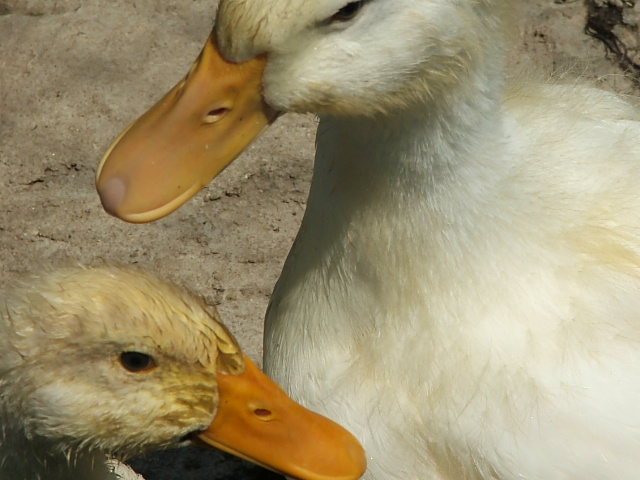
We urge schools to
use alternatives such as picture books, models, videos, and
classroom drawing activities in lieu of hatching programs. Some
ideas and resources for teachers can be found at the following
websites:
United Poultry Concerns - Hatching Projects
AnimalsConcers.org - Hatching Projects
Fortunately, more and
more parents and educators are urging alternatives to these
insensitive projects. As ASPCA president, Roger Caras, writes, "Each
year, the ASPCA receives numerous calls from public school teachers
and science coordinators asking for alternatives to the chick
hatching project. These caring educators have demonstrated their
concern, as well as the concern of their coworkers and the
children's parents, as to the unusual amount of cruelty to animals
that this project entails and its negative educational value."
Majestic does not
condone the hatching of birds in classrooms because we have seen the
results of such programs first hand. As with other subjects,
development and growth cycles can be taught successfully without
bringing live animals into the classroom. However, if you are unable
to convince your local school or teacher to stop hatching, you can
at least insist that they adhere to the following important Golden
Rules.
The Golden
Rules:
1. A safe home for
the ducklings after they hatch must be pre-arranged PRIOR to
acquiring fertile eggs and hatching out birds. Animal shelters
do not qualify as a proper plan.
2. Teachers must
find a qualified waterfowl vet prior to hatching and be willing
to provide vet care at their expense for any ducklings in their
care.
3. Teachers must be fully educated on proper incubation and
adhere to proper techniques to ensure ducklings have the best
chance of a healthy hatching.
4. Teachers must be
fully educated on proper waterfowl nutrition and they must
provide proper duckling food (purchased from a grain store) and
fresh water to the hatchling immediately upon hatching.
This is one of the major offenses…ducklings being fed bread,
cereal and even cottage cheese…leading to malnutrition,
deformities, lameness and even death.
5. Teachers must ensure safe and clean housing for the
ducklings while they are guests at the school. Ducklings should
not be left unattended at the school between classes, overnight,
or on weekends (eggs that hatch out on weekends when no one is
present can have disastrous results), but rather the teacher
should be taking full responsibility for the eggs and hatchlings
at all times. Teachers need to take serious precautions to
protect fragile eggs and ducklings from the hands of overzealous
students. Close supervision is a must to avoid life-threatening
injuries to un-hatched and hatched ducklings.
6. Careful
considerations must be made in advance in case a duckling
hatches out with a physical deformity. It is not that uncommon
for ducklings to hatch out lame. Pre-arranged homes won’t
necessarily work out in these instances; back-up plans are
needed in advance (again, animal shelters are not a proper back
up plan).
7.Teachers need to
exert control over the number of ducklings they hatch out in
their classrooms. It is not necessary to hatch out dozens of
ducklings to teach a single class about development. Avoid
excess.
Find out if your
local schools have a hatching program. If so, please get involved
and ensure that they are being handled responsibly. It is up to YOU
to monitor the education your children are receiving.
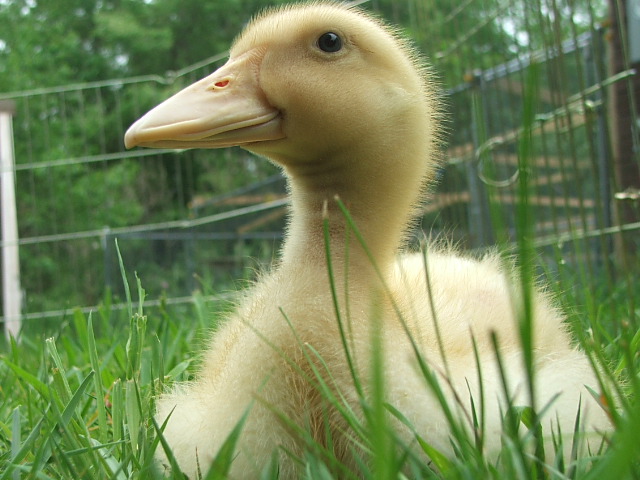
Duck Alien X-Ray

On
Sunday, May 21, 2006 an adult male mallard was brought to the
International Bird Rescue Research Center (IBRRC) (www.ibrrc.org)
with what appeared to be a broken wing. The assistant manager of the
center, radiographed the mallard and was immediately shocked by what
was revealed on the x-ray. A very clear image of what appeared to be
the face, or head, of an extraterrestrial alien was in the bird’s
stomach. Regrettably, IBRRC reports the duck succumbed to its
injuries and passed away quickly, quietly, and peacefully after the
x-rays were taken. A necropsy was done by UC Davis veterinarians and
showed the stomach had some grain in it, but no alien.
The 35 year-old bird
rescue organization put their x-ray of the mallard on eBay and sold
it for $9600 to the Golden Palace Casino. Proceeds from the sale of
this one-of-a-kind x-ray will go towards funding the IBRRC’s
continuing efforts to rescue and rehabilitate oiled, orphaned and
injured waterfowl and aquatic birds.
Visit
http://www.cafepress.com/intbirdrescue
to purchase a t-shirt of the Duck Alien X-Ray. Proceeds
go to the IBRRC.
"In the midst of
all the humor exists a great and destructive surge that is building
momentum; that is the effects humans are having on their, our,
environment. The animals that we see every day in our clinics,
whether damaged intentionally or as the result of human pollution,
are clear evidence of that and their numbers are growing. This is
all a result of our attitudes towards nature and our planet.
Attitudes are powerful as they carry information, apathy and greed,
to name a few, resulting in the environment being a nuisance, or
unimportant." --Jay
Holcomb, 20 year Director of the IBRRC.
|